2018 SkS Weekly Climate Change & Global Warming Digest #18
Posted on 6 May 2018 by John Hartz
Story of the Week... Toon of the Week... Quote of the Week... SkS in the News... Photo of the Week... SkS Spotlights... Video of the Week... Reports of Note... Coming Soon on SkS... Poster of the Week... SkS Week in Review... 97 Hours of Consensus...
Story of the Week...
Pruitt's EPA Is on the Verge of 'Regulatory Capture', Study Says
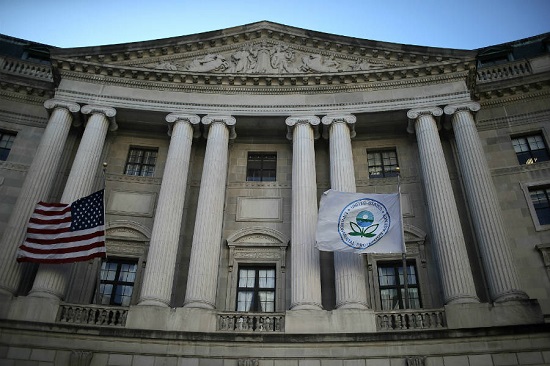
A new study based on EPA documents and interviews found industry influence over the EPA today is stronger than it was during the early Reagan years. Credit: Justin Sullivan/Getty Images
Under the Trump administration, the Environmental Protection Agency has veered so far from its foundational mission of protecting human health and the environment that it faces the highest risk in its 47-year history of being reshaped to serve industry rather than the American public, according to a new study in the American Journal of Public Health.
The EPA routinely faces criticism from environmental and public health advocates for allegedly quashing science and softening rules to help industry. During the early years of the Reagan presidency in particular, EPA Administrator Anne Gorsuch worked to scale back the agency's activities.
But the new study, based on interviews with current and former EPA staff and reviews of White House and EPA initiatives, concluded that the agency is now on the edge of "regulatory capture," when industry priorities determine policy rather than the public interest and impartial research.
"New EPA leadership has thus far aimed at deconstructing, rather than reconstructing, the agency by comprehensively undermining many of the agency's rules, programs, and policies while also severely undercutting its budget, work capacity, internal operations and morale," concluded the study, titled "The Environmental Protection Agency in the Early Trump Administration: Prelude to Regulatory Capture."
The study, part of the American Journal of Public Health's special issue on climate change, adds to the mounting scrutiny and criticism of EPA Administrator Scott Pruitt's policy, personnel and operational decisions, which sometimes weave together.
For instance, the study suggests that the undermining of the EPA's public health mission is enabled in part by Pruitt and his aides making policy decisions with little input from longtime staff and scientists.
Such isolation is cemented by "the extraordinary lengths that Pruitt has [gone to] to preserve secrecy and autonomy from the EPA career staff, such as cordoning his office wing off from career employees, reportedly forbidding note taking at some meetings and employing 24-hour armed guards," the report said. The study was accepted by the peer-reviewed journal in February of this year, before some of the recent scandals around Pruitt had surfaced, including his condo rental from the wife of a lobbyist. He currently faces at least 10 investigations from his EPA tenure.
Pruitt's EPA Is on the Verge of 'Regulatory Capture', Study Says by Neela Banerjee, Inside Climate News, May 1, 2018
Toon of the Week...
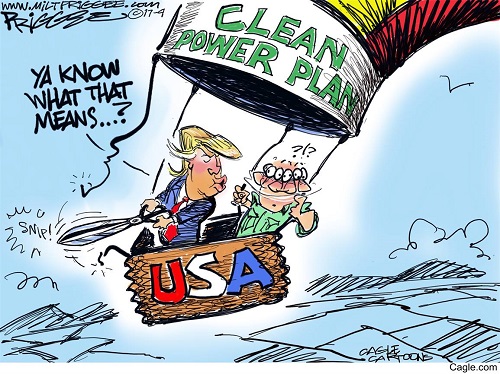
Quote of the Week...
The Earth's atmosphere is more saturated with greenhouse gases now than at any other time in human history. For the first time on record, the average amount of carbon dioxide — the main long-lived gas responsible for global warming — in the air passed 410 parts per million (ppm) for an entire month.
Data collected at the Mauna Loa Observatory in Hawaii had already shown carbon dioxide readings that temporarily exceeded that threshold for a time in 2017 but not for a whole month. The new data collected for the month of April and released on May 2, underscore how quickly carbon dioxide levels continue to rise despite global attempts to reduce emissions.
The new record demonstrates that despite gains made in renewable energy and energy efficiency, heat-trapping greenhouse gases continue to build in the atmosphere, altering the odds and intensity of many extreme weather events, causing sea levels to rise, and a myriad of other effects.
"We know exactly where that CO2 is coming from, and we're pretty clear on what it does," said Kate Marvel, a climate scientist at NASA's Goddard Institute for Space Studies, in an email.
"Combustion — the chemical reaction we use to generate most of the energy we use — gives off CO2 as a byproduct. We've been doing a lot of combusting since the Industrial Revolution, and all that extra CO2 has to go somewhere. Essentially, we've been treating the atmosphere as a dumpster for over 150 years."
Greenhouse gas concentrations hit highest level in human history by Andrew Freedman, Science, Mashable, May 3, 2018
SkS in the News...
The ABC Radio News (Australia) article, Science can't solve climate change — better politics can, former IPCC scientist says, by Anna Salleh includes the follwing section:
Better science communication?
Some, like Australian psychologists John Cook and Stephan Lewandowsky, argued there would be more action on climate if people better understood the scientific consensus.
But Professor Hulme countered that at the heart of the debate were different political preferences and values — such as how much people are prepared to sacrifice now for future generations, and what kind of energy technology we support."People who are just as committed to the evidence of climate change have very different views about what energy mix we should have — between fracking, nuclear and solar," Professor Hulme said.
But Dr Cook, from George Mason University, insisted better science communication can still change views.
Still, even if people agree that humans are changing the climate, this is not the same as accepting a 2-degree limit on global warming.
The link embedded in the above is to the article, Establishing consensus is vital for climate action by Stephan Lewandowsky & John Cook, The Conversation US, Feb 7, 2014
SkS Spotlights...

Frankfurt School - UNEP Collaborating Centre for Climate & Sustainable Energy Finance (the Centre) is a strategic cooperation between the Frankfurt School of Finance & Management (Frankfurt School) and the United Nations Environment Programme (UNEP). Both partners recognise that – for decades to come – climate change will pose a fundamental challenge to the world economy and the financial industry in particular.
The Centre is committed to facilitating the necessary structural change of energy supply and use around the globe by helping to catalyse private sector capital flow towards investments in sustainable energy and climate change mitigation and adaptation.
The Centre combines project implementation on the ground with think tank activities. Its work is cutting edge: the team of experts experiments with new financial mechanisms and implements cutting edge projects, informs policy development and changes the way the financial industry operates. The primary objective is to mobilise significantly increased levels of sustainable energy and climate finance, bridging the public-private sector gap and thereby contributing to the development of a global green economy. Together with partners in different institutions, the Centre is elaborating and field-testing new financial instruments, products and services that serve the growing markets for energy efficient and clean energy production. By implementing and recording findings and instruments in the field where they are most effective, the Centre maximises its knowledge base to become a leading think-and-do tank.
Video of the Week...
Taking climate change seriously: from adaptation to transformation
Seminar with professor Karen O'Brien, University of Oslo, Friday 16 March
Adaptation has been increasingly promoted as a key strategy for reducing risk and vulnerability to the impacts of climate change. Yet what qualifies as successful adaptation when the impacts are the result of human activities? Who decides the future to which we must adapt? In this talk, Karen O'Brien distinguish between technical problems and adaptive challenges and discuss why successful adaptation to climate change will only be realized through social transformations. The talk will draw on research from the AdaptationCONNECTS project, which focuses on the role of creativity, collaboration, empowerment and flexibility in realizing adaptation through transformation.
About Karen O'Brien
Karen O’Brien is a Professor in the Department of Sociology and Human Geography at the University of Oslo, Norway. She is interested in integral approaches to understanding and addressing global environmental challenges. Karen’s current research focuses on the relationships between climate change adaptation and transformations to sustainability. She is the co-founder of cCHANGE.no, an organization that provides perspectives on transformation in a changing climate.
Taking climate change seriously: from adaptation to transformation, Stockholm Resiliance Centre. May 3, 2018
Reports of Note...
Global Trends in Renewable Energy Investment Report 2018
Banking on sunshine: World added far more solar than fossil fuel power generating capacity in 2017
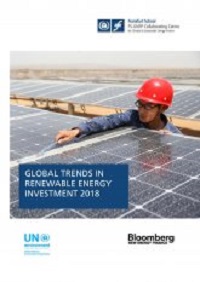
The Global Trends in Renewable Energy Investment 2018 report, published on April 5th by UN Environment, the Frankfurt School-UNEP Collaborating Centre, and Bloomberg New Energy Finance, finds that falling costs for solar electricity, and to some extent wind power, is continuing to drive deployment. Last year was the eighth in a row in which global investment in renewables exceeded $200 billion – and since 2004, the world has invested $2.9 trillion in these green energy sources. Overall, China was by far the world’s largest investing country in renewables, at a record $126.6 billion, up 31 per cent on 2016.
Solar energy dominated global investment in new power generation like never before in 2017. The world installed a record 98 gigawatts of new solar capacity, far more than the net additions of any other technology – renewable, fossil fuel or nuclear and solar power attracted far more investment, at $160.8 billion, up 18 per cent, than any other technology.
In total $279.8 billion was invested in renewables excluding large hydro and a record 157 gigawatts of renewable power were commissioned last year, up from 143 gigawatts in 2016 and far out-stripping the net 70 gigawatts of fossil-fuel generating capacity added (after adjusting for the closure of some existing plants) over the same period.
Global new investment in renewable energy by region, 2017 $bn
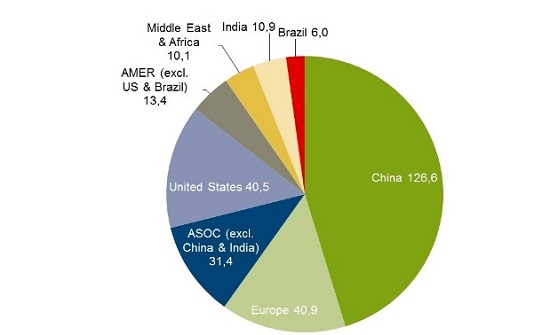
Coming Soon on SkS...
- Global warming will depress economic growth in Trump country (Dana)
- 1970s cooling project, Part 2 (David Kirtley)
- Guest Post (John Abraham)
- Analysis: How much ‘carbon budget’ is left to limit global warming to 1.5C? (Zeke Hausfather)
- New research this week (Ari)
- 2018 SkS Weekly Climate Change & Global Warming News Roundup #19 (John Hartz)
- 2018 SkS Weekly Climate Change & Global Warming Digest #19 (John Hartz)
Poster of the Week...
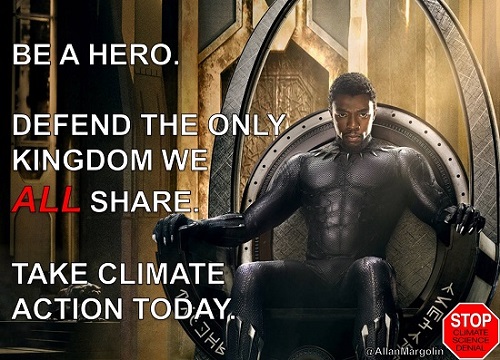
SkS Week in Review...
- 2018 SkS Weekly Climate Change & Global Warming News Roundup #18 by John Hartz
- New research, April 23-29, 2018 by Ari Jokimäki
- The 1970s Global Cooling Zombie Myth and the Tricks Some People Use to Keep it Alive, Part I by David Kirtley
- SkS Analogy 11 - Cabinets, airplanes, and frame of reference by Evan & jg
- TV Meteorologists Seen Warming to Climate Science, Video by greenman
- Republicans have so corrupted EPA, Americans can only save it in the voting booth by Dana Nucitelli, (Climate Consenus - the 97%, Environment, Guardian)
- 2018 SkS Weekly Climate Change & Global Warming Digest #17 by John Hartz
97 Hours of Consensus...
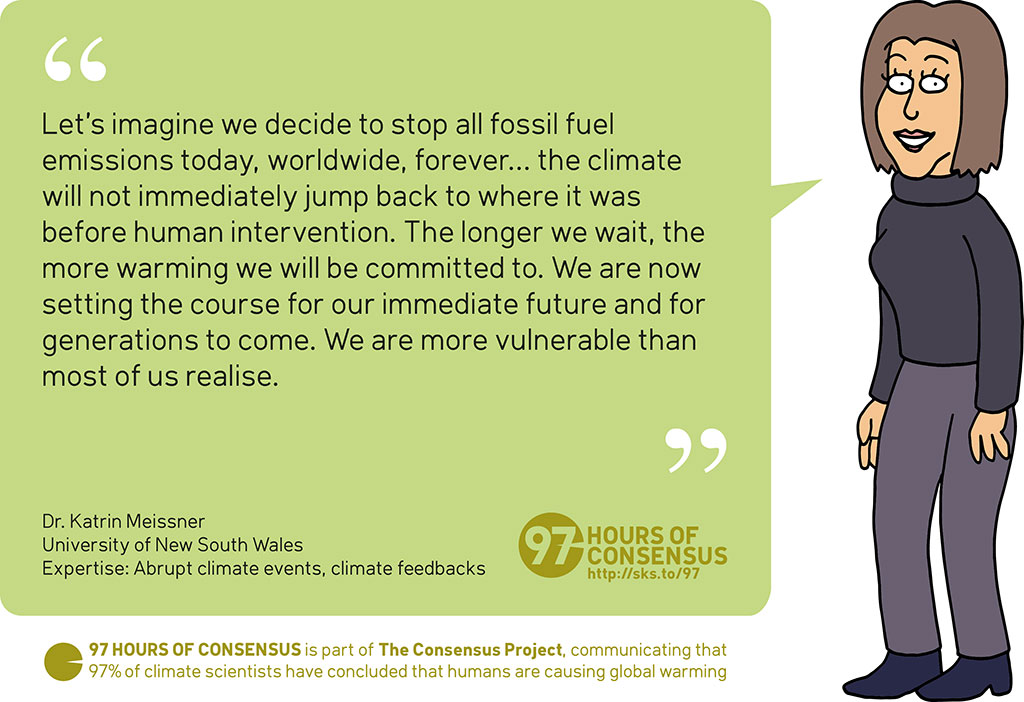
Quote provided by email































 Arguments
Arguments






























Regulatory capture seems like an understatement to me. More like total evisceration.
This article is relevant to the Scott Pruitt issue : "Trump Picks TV Snake Oil Salesman Dr. Oz, of All People, to Serve on Health Council".
Yes its another inappropriate person for the job, and the article has interesting insight on why Trump may have made this particular choice. You will laugh or cry, depending on your mood.
The EPA is indeed under vicious attack and regulatory capture, and it highlights the fundamental tension between capitalism and the environment. Capitalist free maket competition is a great thing and economically efficient, but has the well known negative side effect of environmental damage as costs are transfered to third parties, future generations, or swept under the carpet to fester.
Relying on the goodwill of the leaders of industry to do the right thing regarding the environment and other matters has a poor history, as with some individuals the profit motive coincides with sociopathic tendencies, short term thinking and disregard for the well being of anyone outside their immediate inner circle of people. But then all of us are genetically wired to favour our immediate group, according to scientific research although. this varies form individual to inndividual. As below.
en.wikipedia.org/wiki/In-group_favoritism
But anyway the EPA was established to be a strong body independent of business and government capable of counter acting the tendency of free markets and rogue leaders of industry to pillage and destroy the environment. It balances economic and environmental concerns. It ensures the public good is protected. If it abuses its power, there are already sufficient checks and balances.
The attack on the current EPA is clearly is a full scale attack by corporate vested interests and small government ideologues. They might acquire slightly more material wealth, or so they think, but the net result is the quality of life of the overwhelming majority of people is seriously downgraded.
One of the accusations is that EPA environmental regulations kill jobs. Not according to this research.
Some interesting research on the reasons for climate denialism. Puts vested interests as main factor in denialist personality, with politics / psychology as secondary factors.
Commentators on industry influence on the EPA seem blind to an evil hiding in plain sight. If the industry leaders involved were civilized people, they would be just as concerned as everyone else with public health and the state of the planetary climate and environment. Indeed, the matter of "regulatory capture" would never arise.
The fact that the foregoing industry leaders are concerned only with profits and their wealth and power (in the short-term), never mind the cost to public health and the planet (in the long term), demonstrates their appalling lack of humanity.
[PS] I think this pushing very close to edge of comments policy. I dont this is constructive.